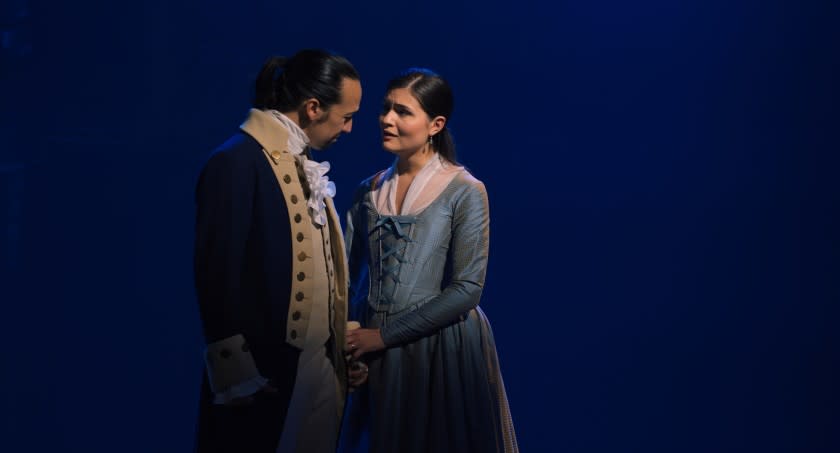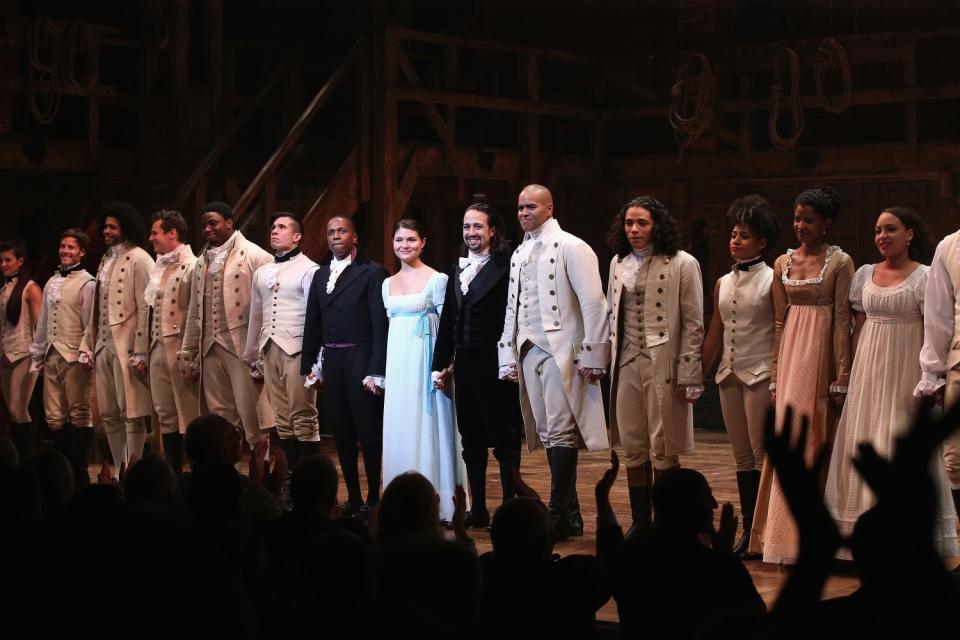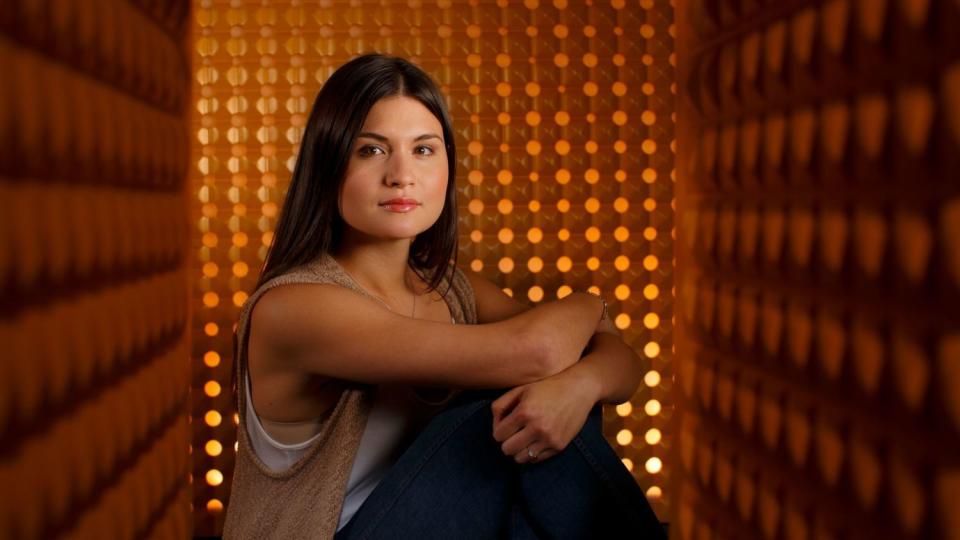Thomas Kail explains how Eliza's gasp at the end of 'Hamilton' came to be

Spoiler warning: The following story contains spoilers from “Hamilton” — both the Broadway show and the filmed version now streaming on Disney+ — including details of the ending.
Though the "Hamilton" cast recording has 46 tracks, it purposefully doesn't encapsulate every single aural moment of the musical. So even the most seasoned listeners of the album were surprised by a few "new" moments in the movie, released on Disney+.
"As someone who grew up ONLY listening to cast albums (we ain’t have money for a lot of Broadway shows, like most people) those withheld moments were REVELATIONS to me when I finally experienced them onstage, years later," Lin-Manuel Miranda explained in a Tumblr post four years ago. "'Hamilton' is sung through, and I wanted to have at least ONE revelation in store for you. I stand by the decision, and I think the album is better for it."
What did the recording miss? The lyricless yet significant redcoat transition, between "You'll Be Back" and before "Right Hand Man." The tragic death of John Laurens (Anthony Ramos), which pushes Alexander Hamilton to work "Non-Stop." Eliza Hamilton's (Phillipa Soo) somber scream over the body of her son.
And that tear-filled, guttural gasp from Eliza that closes the entire show.
Over the years — and especially in the days since the movie was released — viewers have speculated as to what the final moment means.
"I have heard all of these theories," Thomas Kail, who directed the stage show and the movie, told The Times on Thursday. "I'm very pleased that it's generating conversation, that people are thinking about it and talking about it."
Just beforehand, the show's action has jumped to 50 years after the death of Alexander. Eliza lists just some of what she's achieved in that time: interviewing everyone whom her late husband fought alongside, raising funds for the Washington Monument, speaking out against slavery and establishing the first private orphanage in New York City.

In the last few seconds, she steps up to the lip of the stage. With a spotlight shining right on her, she looks out into the audience and gasps.
One popular interpretation is that Eliza, now 97 years old, has died and seen the face of God. Another is that she's seen the face of Alexander. "Oh, I can't wait to see you again / it's only a matter of time," she sings just before that moment.
Another guess has to do with the ensemble, who stand behind her and ask: "Will they tell your story? Who lives, who dies, who tells your story?" Miranda — as himself, the writer-composer of this show! — then takes Eliza's hand and guides her to the lip of the stage. And as she looks out, she realizes that she is in fact the answer to those questions; she is the one who lived, who died, who told her late husband's story.
In this theory, what she sees is "Hamilton" itself: the three-hour musical that recounts his story, and the sold-out audience who just learned about him. And that gasp is Eliza's realization that it was all possible because of her work to preserve his legacy. (After all, the show's title could be referring to her too, not just Alexander.)
So which explanation is the correct one? Years after "Hamilton" opened on Broadway, Miranda remains mum on a definitive answer. "The Gasp is The Gasp is The Gasp," he recently said on Twitter. "I love all the interpretations." (While also gently pointing out that particular reading may be more difficult when he's not playing the role.)
Kail recalled to The Times how the ambiguous moment — which was not in Miranda's original script — came to be. "It came from a conversation Pippa and I had when we were still off-Broadway, either in the [rehearsal] room or in tech, and it was once I knew what that final light cue was going to be.
"I remember it was important for me to have a moment at the end of the show where the music and lyrics are resolving that extended past, that reached somewhere else. Pippa is so thorough and so intelligent and so precise, that it was a really fun conversation to have. Of course we'd only do it if Lin was OK with it, which he was. That speaks to Lin's generosity — he was thrilled to have that be the final moment of the show."

Many fans are probably as surprised to see this moment as Soo's fellow actors were in 2015. "It's not something we talked to the rest of the company about; it wasn't like we had some big cast meeting or something. It was something only we spoke about, and then she just started doing it," said Kail.
"I think everybody was experiencing it onstage together, just as the audience does. And it evolved — she tried different things and then we talked about it, just like any other moment."
Since Soo left the production in 2016, and with the opening of simultaneous stagings worldwide, many actresses have played the role of Eliza. Kail has spoken with the various performers about understanding and executing this gasp.
"Other Elizas have their own version of it that's real and attached to the performer," he explained. "Our performances aren't recorded — legally — but if you were to put all of the Elizas' last moments together, back to back to back in a supercut, they would be related, but quite different. That's the beauty of the interpretive nature and philosophy behind making theater: It's always a little bit different, and each actor is going to bring themselves to the part.
"We're not a group who tries to replicate or just mimic what happened before; we like to leave the space for whomever the actor is and where they intersect with the part. Even if they might have the same physical blocking or choreography or moments to play, their interpretation of the role is their own. That Eliza moment is in some ways a crystallization of that, down to this very still last few seconds."
Does a definitive explanation for the gasp even exist? "There is an answer, but I don't know that I'm really keen to share it, because I love the conversation," said Kail.
"And whenever I encounter something, I don't know if I'm all that interested in what the thing was supposed to be. I like to, as an audience member, absorb and hear all the conversation about it, and sometimes it's not always particularly satisfying to know what it was. It's like, 'Oh, that's dumb.'"
The answer, ultimately, lies with Soo, who originated the role of Eliza. "She is the holder of that flame and if she wants to share that, I support her," said Kail. "Pippa can do whatever Pippa wants! But it will not come from me."
Soo somewhat answered the question back in 2016. "It kind of always changes," she said. "To me, the moment always belongs to all of us in the entire room. It's a culmination of the entire experience that we just had as the audience, as the cast, as the characters.
"People are like, 'Is it Eliza going into heaven? Is she seeing Alexander? Is she seeing God? What is it?' And it's kind of all of those things," she continued. "Sometimes it's literally: I look out and see the audience, and that's what it is. But I think the idea of transcendence is present in all of that, whether it's in Eliza's mind or Phillipa's mind, they're both one and the same, which is beautiful about that moment."

